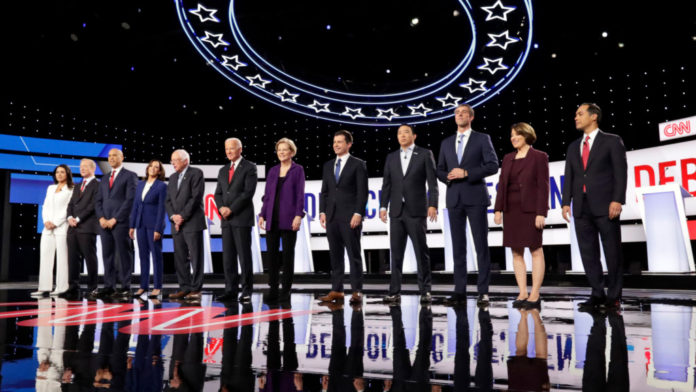
In what was the largest field of primary candidates to take the same stage on the same night, the Democratic presidential hopefuls met in Westerville, Ohio, to continue to try to gain support for their campaigns. Hosted by CNN and the New York Times, the October 15 debate touched on ongoing issues and new developments. Twelve candidates qualified for the debate: Vice President Joe Biden; New Jersey Senator Corey Booker; Southbend, Indiana Mayor Pete Buttigieg; Former HUD Secretary Julián Castro; Hawaii Congresswoman Tulsi Gabbard; California Senator Kamala Harris; Minnesota Senator Amy Klobuchar; Former Texas Congressman Robert Francis “Beto” O’Rourke; Vermont Senator Bernie Sanders; businessman and billionaire Tom Steyer; Massachusetts Senator Elizabeth Warren; and businessman and entrepreneur Andrew Yang.
The Issues
Impeachment
With growing concerns regarding the whistleblower report and President Trump’s sketchy dealings with Ukraine, it is no surprise this was a prime topic.
All of the candidates concurred that President Trump should be impeached. Congresswoman Gabbard, however, conveyed concern about the integrity of the impeachment process. Andrew Yang did not express an aggressive attitude towards the inquiry, stating that impeaching Trump will not fix the issues that got him elected.
Among the most vocal in calling out the President were Kamala Harris and Bernie Sanders, both explicitly calling Trump the most corrupt president in history. Tom Steyer also referred to Trump as the “criminal” in the White House.
Other candidates like Pete Buttigieg and Beto O’Rourke looked beyond the impeachment and focused on rebuilding the country after the Trump Administration. Buttigieg, in particular, emphasized unity in the wake of Trump’s divisiveness.
Corruption
The debate addressed the controversy surrounding Joe Biden and his son’s dealings in Ukraine and China while he was Vice President. When asked if it was acceptable for vice presidents to have family members involved in foreign business, Joe Biden stated he and his son “did nothing wrong.” He then turned the tables, saying that Trump has lied and cheated by seeking Ukrainian help.
Bernie Sanders also jumped in on the issue, stating that while corruption must be defeated, politicians cannot forget about the people and the problems concerning them.
Healthcare
As with the last few debates, all of the candidates reiterated the same central point: healthcare is a right. However, the candidates were more direct in calling out the flaws in the other’s plan.
For instance, while Elizabeth Warren addressed the corruption and immorality of insurance companies and stated taxes will increase for the rich, she refused to acknowledge the financial issues with Medicare for All. Pete Buttigieg called out Warren for dodging the question on middle-class tax increases, stating her vagueness is why people do not trust Washington. He restated his plan of Medicare for All Who Want It as a cheap and equally efficient alternative, which allows people also to keep their private insurance, something Medicare for All would abolish. Amy Klobuchar called out Warren, saying at least Sanders is open and honest about Medicare for All. She also referred to Warren’s idea as a “pipe dream.”
Bernie Sander matched Warren’s talking points about both tax increases on the rich and a decrease in overall healthcare costs for all.
Joe Biden entered the conversation explaining that both Pete Buttigieg’s and Amy Klobuchar’s plans were his idea. He attacked Bernie Sander’s and Elizabeth Warren’s plan for raising middle-class taxes. Sanders cited that he is tired of people defending cruel and dysfunctional systems.
Jobs
One topic which flew under the radar in last month’s debate was the economy. One overarching threat to jobs, which all candidates addressed, is automation.
Bernie Sanders promised that every American would have a guaranteed government job. He claimed infrastructure and a green economy would create jobs for Americans. While he was the furthest left on the issue, fellow candidate Julián Castro voiced openness to the idea of a Green New Deal facilitating the creation of new jobs.
On the contrary, Andrew Yang promoted his hallmark idea of a universal basic income (UBI). He said that not only do most people not want to work for the economy, but UBI will create a “trickle-up economy,” which benefits all. Tulsi Gabbard reiterated Yang’s ideas.
Elizabeth Warren appeared to be in support of a UBI-like system but would prefer to extend the “solvency” of Social Security and allow people to “retire with dignity.” Corey Booker backed this idea, arguing that raising the minimum wage would put dignity back in work.
In the wake of the General Motors and United Auto Workers union conflict, both Corey Booker and Beto O’Rourke voiced support for elevating unions and bringing workers to the forefront in trade deals. O’Rourke went further to say that people want a fair working environment rather UBI or a job guarantee.
Wealth Inequality
Another point overshadowed in the previous debate was the growing issue of wealth inequality. Bernie Sanders framed wealth inequality as a moral issue, saying the wealthiest should pay their fair share. Tom Steyer, the only billionaire on-stage, agreed with Sanders on repealing the Trump tax cuts and ending corporate corruption. He failed to defend his status as a billionaire, however.
Joe Biden added that we must reward work and not wealth. He also vowed to increase taxes on the rich to shift the burden.
Elizabeth Warren introduced the idea of a wealth tax on the richest of the rich. She framed the idea as a remedy to pay for programs like universal pre-k to college tuition. She repeatedly referenced the wealth tax, citing it addresses the limitations of an income tax and promotes equality. Pete Buttigieg and Julián Castro (to an extent) agreed with Warren’s idea of a wealth tax.
Moderate candidates such as Amy Klobuchar attacked Warren’s idea, saying, “your idea is not the only idea.” Beto O’Rourke also asserted that Warren was being punitive and further dividing the nation with her controversial proposals. Andrew Yang disagreed with Warren on the idea of a wealth tax, citing examples of European countries where it has failed. Instead, Yang argued for a value-added tax. Kamala Harris also proposed her plan for tax credits to working families.
Corey Booker ended the segment, arguing for fair taxes on the rich and encouraging increased focus on the issues of child poverty.
Foreign Policy
With President Trump withdrawing troops from northern Syria last week, most of the candidates were quick to call the President’s action.
Joe Biden spoke with passion as he condemned Trump’s withdrawal from Syria and called out the President’s shameful act of abandoning the Kurds. Elizabeth Warren stated that while we should not have troops in the Middle East, Trump’s impulsive “cut-and-run” attitude towards allies hurts the US’s perception.
Pete Buttigieg and Tulsi Gabbard, the only two veterans on stage, also got into a debacle. Buttigieg criticized Gabbard’s stance on a full withdrawal from the “regime change wars” in the Middle East, including Syria. He stated that while we need to get out of Afghanistan, ISIS and genocide are brewing in Syria. He also pointed out that America has lost its credibility to stand by its word in the global community. Gabbard responded by saying the US involvement in Syria has led to the US arming terrorists.
On the topic of whether or not Turkey is our ally, Bernie Sanders claimed Turkey is not an ally. He also reiterated Pete Buttigieg’s point that Trump has hurt the US’s global perception.
Kamala Harris, Julián Castro, and Corey Booker all agreed Trump fostered a crisis in the Middle East. Booker, for instance, described how Trump is turning the moral integrity of the US into a “dumpster fire.”
Beto O’Rourke, Tom Steyer, Andrew Yang, and Amy Klobuchar all stated that they would stand up to Russia and expose Putin’s corruption.
Gun Violence
Beto O’Rourke took the far left position on the issue by proposing a mandatory assault weapons buyback. When asked how this process would work, he said if one does not voluntarily give up their weapon, it will be met with “consequences.” Pete Buttigieg called out how O’Rourke lacked competence on how to implement the plan and instead advocated for red flag laws and universal background checks.
Joe Biden and Elizabeth Warren advocated for a system similar to that used with automatic rifles. Biden also pointed out his record as being the only one who has successfully taken on the National Rifle Association (NRA).
Julián Castro also opposed a mandatory buyback because of its complex implementation and definition. However, he even disagreed with the proposal because he does not want to give the police another opportunity to go door to door, alluding to the issue of police brutality.
Opioid Epidemic
Amy Klobuchar opened the issue with a compelling argument about the corruption of opioid manufacturers. Tom Steyer added to Klobuchar’s point that drug companies are corrupting the government.
Andrew Yang and Beto O’Rourke promoted the legalization of drug use to treat drug abuse as mental health and not a criminal issue. O’Rourke also hinted at the positive consequences of legalizing marijuana.
Both Kamala Harris and Julián Castro agreed that drug company executives should face imprisoned for the opioid epidemic.
Candidate Health
Since Bernie Sanders suffered a heart attack around a week ago, some have questioned the longevity of specific candidates. Primarily aimed at Sanders, he stated, “I’m healthy. I’m feeling great.”
Joe Biden, whose age has been concerning, said he knows what the job is, so age isn’t an issue. He also equated his age to wisdom, saying he can command respect from allies and adversaries. Biden also promised to release his medical history before the end of the year.
Elizabeth Warren stated that her work ethic would allow her to beat anyone on the other side.
Tulsi Gabbard, one of the younger candidates, addressed how it is not fair to only question the older candidates. Rather than focusing on age, Gabbard hopes that the most qualified person wins the election. She pointed out her own military experience as evidence of her excellent diplomacy.
Big Tech
With Amazon and Google forming what some consider to be monopolies, the legitimacy of big tech was questioned. Andrew Yang began by agreeing with Elizabeth Warren’s stance on breaking up big tech; however, he asserted that competition does not solve all the issues. Warren vowed to enforce antitrust laws to which Tom Steyer concurred. Corey Booker also followed suit and supported Warren.
Beto O’Rourke then redirected the conversation to the regulation of content, saying we need clear “rules of the road” for tech companies. Kamala Harris interjected, calling for Twitter to ban Trump’s Twitter account due to hate speech and incitement of violence. Elizabeth Warren digressed from Harris’s stance, refusing to join her in advocating for banning Trump’s Twitter.
Amy Klobuchar and Julián Castro concluded by vowing to fight against consolidation and to promote healthy competition.
Reproductive Rights
As new abortion rights cases make their way to the Supreme Court, reproductive rights have again gained high publicity.
Kamala Harris argued that she would require preclearance for any state laws in violation of Roe v. Wade. Amy Klobuchar, Joe Biden, and Julián Castro voiced support for codifying Roe, guaranteeing a woman’s right to choose. Castro illustrated the issue as “reproductive justice.” Biden framed reproductive rights as “constitutional rights” and a “right to privacy.”
Corey Booker asserted that attacks on abortion are attacks on people in poverty. He stated that humans, particularly women, should have autonomy over their bodies. He even went as far as to propose a Department of Reproductive Freedom in his administration. Elizabeth Warren reiterated Booker’s point about poverty. She also argued that abortion rights should be dealt with in Congress and not through the Courts.
Within the debate on reproductive rights, the candidates addressed the idea of court-packing (expanding the Supreme Court). Joe Biden and Julián Castro opposed the idea of expanding the Court. Pete Buttigieg, by contrast, presented his case for widening the Court to fifteen seats.
Themes
Answer the Question!
One of the most irritating parts of the debate was the dodging or vague answering of questions. Elizabeth Warren’s deflecting of questions and concerns about raising middle-class taxes in regards to healthcare made her plan look weak. Joe Biden also was very vague in his response to questions about his son’s dealing overseas, vindicating him while not taking a stand and saying family members of government officials should not engage in foreign business.
Beto O’Rourke also was not able to answer when asked about the logistics of implementing a government buyback of assault weapons. Pete Buttigieg calling out his incomplete explanation, demonstrates an overall pattern in the Democratic Party of ignoring the weak or impractical aspects of a given plan.
Unity Against Trump
No one on the stage liked Trump. While they all ideologically disagree, they also conveyed their hatred towards the President through critical attacks on his personality. From Beto O’Rourke claiming his racism and xenophobia played a roll in the mass shooting in El Paso to Kamala Harris calling Trump the most unpatriotic president in history, the attacks illustrated the collective bashing of the President.
The candidates continued to double down on berating Trump’s actions and strategies. Amy Klobuchar stated that Trump is working to “make Russia great again.” Kamala Harris also said that “dude gotta go” due to his incompetence as commander in chief.
Corey Booker stood out as the peacemaker of the candidates, saying many times that the dialogue occurring on the stage is detrimental to defeating Trump. He called for respect for one another and to realize that Trump is the enemy. Booker also voiced his concern regarding how the candidates spoke with each other on-stage, worried the heated exchanges could spark division within the party.
Winners & Losers
Winners
Pete Buttigieg was the undoubted winner throughout the debate. From his successful attack on Elizabeth Warren’s vague answers regarding Medicare for All to telling Beto O’Rourke, “I don’t need lessons from you on courage” in response to O’Rourke’s statement on gun control, Buttigieg controlled the stage. He was never lost for words and showed he could incorporate a progressive agenda while staying within the bounds of reality. In contrast to Warren, Biden, and Sanders, he also appeared as the young, intelligent leader whom the more youthful generations could look up to. His wisdom on how to handle the future after Trump also resonated with many people as an antithesis to Biden’s back-to-normal approach.
Bernie Sanders had a strong performance in defending his position, despite suffering a heart attack recently. While his Medicare for All plan is impractical to some, Sanders acknowledged its ambition. He also was able to incorporate humor into the debate, such as facetiously talking about his health and also taking a friendly jab at Biden when he called him Putin. Sanders also did an excellent job of trying to promote party unity.
Amy Klobuchar emerged as a winner similarly to Buttigieg: calling out the irrationality and vagueness of the hyper-progressive plans. While still trying to promote herself as the peaceful moderate, she did not shy away from going on offense to argue her points, such as when she corrected Andrew Yang’s callow statement comparing the US and Russian election meddling. She also successfully made many emotional appeals, both invoking her dad’s alcoholism and quoting disturbing comments by big pharma executives intentionally hooking people on opioids. Overall, she had a big night in comparison to past performances where she sat in the background.
Losers
Kamala Harris had a poor performance and was relatively quiet throughout the night. The only noteworthy part of her performance was when she tried to persuade Elizabeth Warren to ban Trump’s Twitter. However, Warren never complied, and so her efforts fell short. She appeared disinterested at times in the debate. For instance, when talking about wealth inequality, she sounded lost for words and looked bored on-stage. In contrast to the fiery lawyer from the first two debates, Harris looked aloof and was not a dominant voice.
Elizabeth Warren found herself as the prime target and was not prepared to fend off all the attacks. From Pete Buttigieg’s attack on her healthcare plan to Klobuchar dogpiling on the same issue, Warren failed to keep the high ground. On top of leaving questions vague and reiterating the same ideas from the last debate, she seemed to bring nothing new to the table. The only new plan, the wealth tax, fell short as other candidates voiced concerns about the implementation. She also lost popularity when she failed to recognize Joe Biden’s past help, which advanced her Senate agenda. Overall, she did not perform like the frontrunner.
Tom Steyer was both droning and cliché. His strategy of using unprovoked personal attacks on the President, such as calling his friends “thugs,” fell short. He also did not speak in a way that captivated the attention of the audience. Added with his creepy habit of staring straight into the camera and into your soul, Steyer had a rough night. It would not be surprising if this were his last debate.
Check back to The Roundup for more on the 2020 Election and US Political News!





